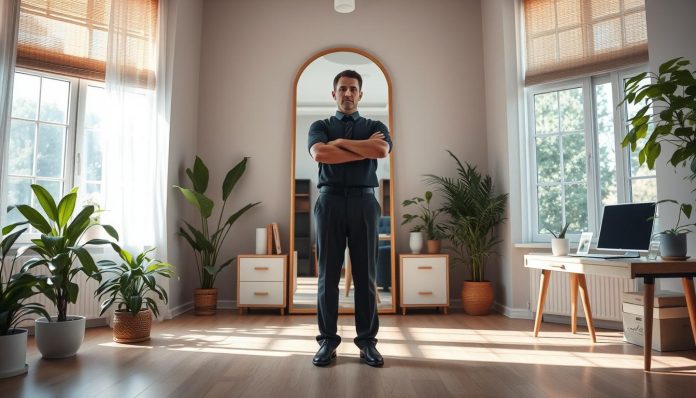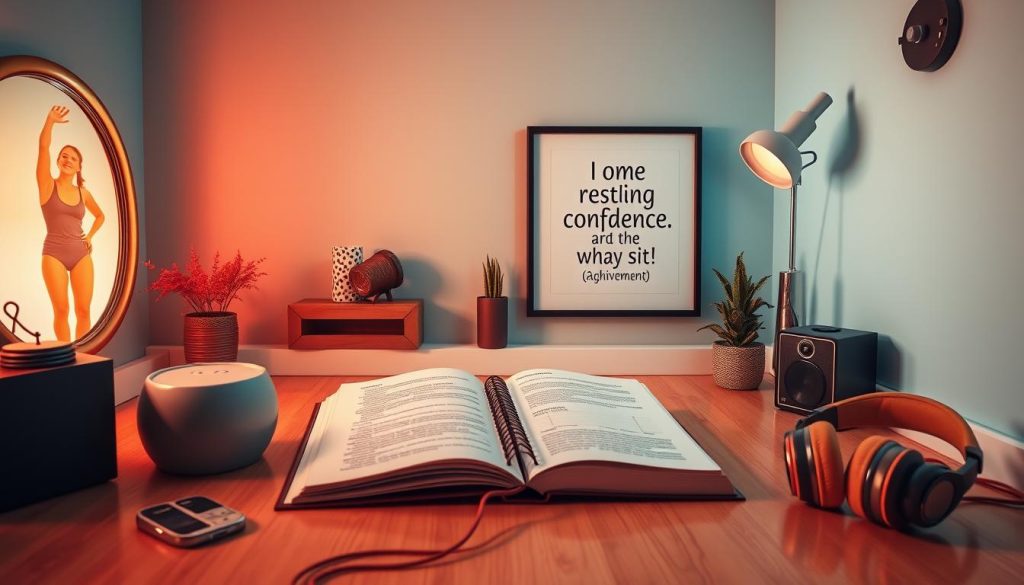Building confidence is key to growing personally. It lets you feel at ease in any setting, like social events or meetings. Using the right tips and techniques can help you boost your self-esteem and reach your goals.
This article will show you how to build lasting confidence. You’ll learn about positive self-talk and finding what makes you confident. You’ll get a full guide on how to boost your self-esteem and own any room you walk into.
Introduction to Confidence Building
You’ll discover how to build confidence and take charge in any situation. This will boost your self-esteem and help you achieve your dreams.
Key Takeaways
- Building confidence is essential for personal growth and development
- Using confidence building tips and self-confidence techniques can help boost self-esteem
- Practicing positive self-talk is a key component of building confidence
- Identifying confidence triggers can help you develop unshakable confidence
- Implementing effective strategies can help you own every room you enter
- Boosting self-esteem is critical for unlocking your full capacity
- Developing a growth mindset is vital for confidence and success
Understand the Importance of Confidence
Confidence is key in our daily lives, more so in social settings. It helps us talk well and form strong bonds with others. To improve public speaking skills, try positive self-talk and visualization. These methods help you feel more at ease when speaking in front of people, leading to success in many areas.
Body language is also vital for confidence. It shows how others see us. Paying attention to our posture and facial expressions can show confidence or lack of it. Being aware of our body language helps us make a good impression and feel more confident.
Confidence isn’t something we’re born with; it’s something we can build over time. By facing common doubts about confidence and using self-assurance methods, we can become more confident. Remember, confidence is essential for reaching our goals and realizing our full potentials.
Why Confidence Matters in Social Situations
In social settings, confidence is very important. It helps us make a good impression and build strong relationships. Without confidence, we might not reach our full abilities or achieve our goals.
The Impact of Body Language on Perception
Our body language greatly affects how others see us. It’s important to be aware of this in social situations. By using positive body language, like standing straight and making eye contact, we show confidence and self-assurance.
Overcoming Common Misconceptions About Confidence
There are many wrong ideas about confidence that can stop us from growing it. One big mistake is thinking confidence comes naturally, not that it can be learned. Knowing confidence can be developed helps us start becoming more confident and self-assured.
Identify Your Confidence Triggers
To build confidence, it’s key to know what makes you feel good. Think about times when you succeeded. This can help you see your strengths and boost your confidence.
Start by recalling moments when you felt confident. What were you doing? What skills were you using? How did you feel? This helps you spot patterns and triggers for your confidence.
Reflect on Past Successes
Looking back at your successes can show you what you’re good at. It also helps you grow, focusing on learning over being perfect. This way, you can build confidence and tackle social anxiety.
Recognize Your Strengths
Knowing your strengths is essential for confidence. Use what you’re good at to overcome weaknesses. This self-awareness helps you develop strategies to face social anxiety and boost your confidence.
Engage in Self-Affirmation Practices
Practicing positive self-talk and affirmations can boost your confidence. Regularly doing this can make you see yourself in a more positive light. It helps you feel more confident in social situations, using self-assurance methods to conquer social anxiety.
Practice Positive Self-Talk
Building confidence starts with a positive mindset. Positive self-talk helps you fight off negative thoughts. It makes you feel more confident. Use confidence building tips like changing negative thoughts to positive ones and focusing on your strengths.
Try self-confidence techniques like visualization and daily affirmations. Visualization lets you see yourself achieving goals and facing challenges. Daily affirmations help you say positive things to yourself, boosting your mindset.
Techniques for Reframing Negative Thoughts
Changing negative thoughts is key to confidence. It helps you think more positively and fight self-doubt. Identify negative thoughts and swap them for positive, uplifting ones.
The Power of Visualization
Visualization is a strong tool for confidence. It lets you imagine yourself succeeding and overcoming obstacles. Use all your senses to create a clear picture of your success.
Daily Affirmations for Lasting Change
Daily affirmations are a simple yet powerful way to build confidence. Saying positive things to yourself every day boosts your confidence. Use self-confidence techniques like affirmations to fight negative thoughts and build confidence.
Set Achievable Goals for Confidence Building
To start building confidence, it’s key to set goals you can reach. First, understand what confidence means to you. Then, set goals to boost self-esteem or improve public speaking skills. This gives you a clear path for growth.
Make your goals SMART – specific, measurable, achievable, relevant, and time-bound. This makes sure your goals are doable. For example, if you aim to improve public speaking skills, a SMART goal could be to speak in front of a small group in three months.
Break your goals into short-term and long-term ones. Short-term goals give you quick wins and motivation. Long-term goals keep you focused on your ultimate goals. Remember, boosting self-esteem is a journey, and it’s okay to take it one step at a time.
Tracking Progress
It’s important to track your progress regularly. You can use a journal or a mobile app to log your successes and challenges. This helps you see where you need to improve, making it easier to improve public speaking skills and boost self-esteem.
Master the Art of Body Language
Building confidence means understanding body language’s big role. When you walk into a room, people see your posture, facial expressions, and gestures first. To make a good impression, focus on confident body language.
Posture: Stand Tall and Own Your Space
Good posture shows confidence. Stand tall with your shoulders back and head up. This simple change can make you feel more confident and open to others.
The Role of Eye Contact
Eye contact is key in body language. When talking to others, keep eye contact to show you’re interested. Not making eye contact can make you seem nervous or unsure.
Gestures That Convey Confidence
Confident gestures matter too. Try uncrossing your arms or standing with your feet apart. These small changes can make you seem more confident and approachable.
Develop Effective Communication Skills
Building confidence means improving how you talk to others. It’s not just about speaking loudly. It’s about sharing your thoughts with confidence. Focus on listening well, speaking clearly, and starting interesting conversations. This way, you’ll make friends and talk well in many situations.
Active listening is key. It shows you care about what others say. This builds trust and makes it easier to share your thoughts. Speaking clearly shows you’re confident and makes a good impression.
To have great conversations, look for things you both like. Ask questions that encourage others to share. This way, you connect better and share your ideas confidently. Learning these skills takes time but is vital for feeling more confident.
Using self-assurance in your talks makes you more confident. This helps you overcome shyness and make stronger friendships. So, start working on your communication skills today. Your confidence will grow.
Prepare for Social Interactions
To feel confident in social situations, prepare beforehand. Research the venue and context, dress well, and practice different scenarios. This way, you’ll be ready for any social interaction.
Use confidence building tips like visualization and positive self-talk. Also, practice self-confidence techniques like assertive body language and active listening. These can greatly improve how you interact with others.
Researching the Venue and Context
Knowing the venue and context of a social event helps you prepare. Look up the location, the people you’ll meet, and the conversation topics. This knowledge boosts your confidence.
Dressing for Success
Dressing right for a social event can also increase your confidence. Wear clothes that make you feel good. This way, you’ll feel more self-assured and ready to meet others.
Learn from Confident People
To get better at public speaking and feel more confident, learn from those who are. Watch how they talk and act around others. This can help you understand what makes them so sure of themselves. Look for mentors or people you admire who show the confidence you want.
When searching for confident people, see how they communicate well. Notice how they share their thoughts, keep eye contact, and use their body to send messages. Also, learn how they handle tough feedback or situations.
By taking lessons from others, you can find your own way to be confident. This might mean talking positively to yourself, setting goals, and slowly stepping out of your comfort zone. As you learn and grow, you’ll feel more sure of yourself and speak better in public.
Finding Mentors and Role Models
Find people who make you want to be more confident. Watch how they act, ask for their advice, and learn from their stories. This is a great way to build your confidence and speak better in public.
Observing Effective Communicators
Watch how confident people talk. Pay attention to their voice, how they connect with their audience, and their ability to hold attention. By seeing these skills, you can improve your own communication and feel more confident when speaking.
Embrace Vulnerability and Authenticity
As you work on building confidence, it’s key to understand the value of being open and real. Being yourself can boost your self-esteem and make you stronger. This helps you enhance your presence and charisma when you’re with others, making it easier to form connections and relationships.
Being authentic means you’re more likely to share your life with others. This can help you build strong bonds and feel good about yourself. By accepting your flaws, you also become more kind and understanding, not just to yourself but to others too.
It takes courage to be vulnerable and authentic, but it’s a vital step in gaining confidence. By being true to yourself and sharing your story, you can grow stronger and enhance your presence and charisma in social settings. Remember, boosting self-esteem is a journey, and it’s okay to take it one step at a time. With patience, practice, and persistence, you can build the confidence needed to succeed in life.
As you embrace vulnerability and authenticity, remember it’s a journey. It takes time and effort to build a strong sense of self and confidence. But with the right mindset and support, you can reach your goals and become the best version of yourself. By enhance your presence and charisma, you can open up new opportunities and experiences that will help you grow and thrive.
Overcome Fear with Exposure
To conquer social anxiety and boost self-confidence, face your fears directly. Exposure to uncomfortable situations can build confidence. Start by taking small steps outside your comfort zone to feel more at ease.
Remember, repetition is key when increasing self-assurance in social situations. The more you face uncomfortable situations, the more confident you’ll become. Learning to handle negative reactions gracefully is also important. It helps you stay calm and composed, even when faced with adversity.
By following these steps and consistently working to conquer social anxiety, you can build the confidence needed for social success. Be patient with yourself and take things one step at a time. With time and practice, you can increase self-assurance in social situations and become the confident person you’ve always wanted to be.
Gradual Steps Out of Your Comfort Zone
Begin by identifying small, manageable steps to challenge yourself. This could be as simple as starting a conversation with a stranger or attending a social event alone.
The Power of Repetition in Building Confidence
Consistency is key in building confidence. The more you practice facing uncomfortable situations, the more confident you’ll become. Try to challenge yourself regularly, whether it’s daily, weekly, or monthly.
Handling Negative Reactions Gracefully
Not everyone will react positively to your newfound confidence, and that’s okay. Learn to handle negative reactions with grace and poise. Remember, their reactions often say more about them than about you.
Celebrate Your Growth and Milestones
As you’ve worked hard to build your confidence and learn new skills, it’s key to celebrate your wins. Reflect on your journey and honor your achievements.
Looking back at your progress can make you feel accomplished and keep you motivated. Acknowledge the small victories and reward yourself for your efforts. This could be as simple as going out for a treat or buying something you’ve wanted.
Keeping a confidence journal is also a great way to track your growth. Write down your thoughts, experiences, and milestones regularly. This helps you see how far you’ve come and reminds you of your strengths when doubts arise. Celebrate every step forward, no matter how small, to keep moving towards your goals.
Building confidence is a journey, but celebrating your progress helps you stay confident. Take pride in your growth and let it drive you to achieve even more.
FAQ
What is the importance of confidence in social situations?
Confidence is key in social situations. It lets you talk well and make strong bonds. Your body language shows a lot about your confidence.
How can I identify my confidence triggers?
Finding what makes you confident is important. Think about when you’ve done well and what you’re good at. Positive self-talk and affirmations can also boost your confidence.
What are some techniques for practicing positive self-talk?
Positive self-talk is vital for confidence. Changing negative thoughts to positive ones helps. Visualizing success and daily affirmations also build confidence.
How can I set achievable goals for confidence building?
Setting goals is key to growing confidence. Use SMART goals to plan clearly. Having both short and long goals keeps you motivated.
What are the key elements of confident body language?
Good body language is essential for confidence. Stand tall and make eye contact. Your gestures show confidence and authority.
How can I develop effective communication skills to build confidence?
Good communication builds confidence. Listen well, speak clearly, and engage in conversations. This helps you connect and communicate effectively.
What can I do to prepare for social interactions and build confidence?
Preparing for social events boosts confidence. Know the place, dress well, and practice scenarios. This makes you feel ready and confident.
How can I learn from confident people to build my own confidence?
Learning from confident people helps. Find mentors, watch how they communicate, and use their lessons. This improves your speaking and confidence.
Why is embracing vulnerability and authenticity important for building confidence?
Being real and open is vital for confidence. Share honestly and accept flaws. This builds strong relationships and a positive self-image.
How can I overcome fear and build confidence through exposure?
Facing fears builds confidence. Start small, repeat steps, and handle negative reactions. This helps you grow and overcome anxiety.
What are some ways to celebrate my growth and milestones in building confidence?
Celebrating your progress is important. Reflect on your journey, reward yourself, and keep a journal. This keeps you motivated and tracks your growth.




